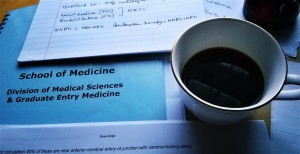August 31, 2015, by studentcontributor
Graduate Entry Medicine (Part 2)
 Hello, and welcome back! I am sharing my top tips and considerations for applying to do Graduate Entry Medicine. If you missed last week’s post, find it here! If not then let’s dive in!!
Hello, and welcome back! I am sharing my top tips and considerations for applying to do Graduate Entry Medicine. If you missed last week’s post, find it here! If not then let’s dive in!!
Finance
If you are considering GEM I have one word for you: save. It is exhaustingly expensive being a student again especially if you are used to a full-time pay cheque. Everyone has different time commitments. So don’t rely on any part-time income. I have a bunch of GEM friends who work but an equal number who couldn’t possibly make the time. Funding seem to be continuously under debate, but as I write this you need to fund your 4 years using a mixture of Student Finance, University-specific grants, NHS Bursaries, savings, and Grandma’s tips to a frugal life (no, it is not a book!).
Reference
Medical Schools and UCAS have specific requirements for References. Some need comments on your academic strength while others want a healthcare professional’s opinion of you as a prospective doctor. Work experience based healthcare professionals might be your best ports of call.
 Personal statement
Personal statement
Boy, had I stared at the screen while writing mine! Ask me to write a report at work and watch me go! But a personal statement?! My top tip? Use this space to refer to work experience, what you learnt from it, and how that links to being a doctor. It is also a good space to show how you balance your life and why Medicine now. Stand out, be yourself but keep it relevant! Ask a trusted friend for feedback once you have written it.
Entrance exam
There are many schools of thought about which one to do. Some go for all 3- UKCAT, BMAT, and GAMSAT. They are intense, require focussed practice, and are a royal pain in the neck! So select books that you find useful & buckle down- no other way to cross this hurdle. Some Medical Schools have cut offs for interviews or offer, which they publish on their website.
Interviews
Double-check the format of interview before the day! It helps with preparation. Also some medical schools read UCAS personal statements after GEM interviews, a few actually refer to your statement during the interview, while others ensure interviewers have nothing to do with your personal statement. So don’t assume your interviewers know anything about you. Repeat important facts about yourself and/or work experience at every relevant opportunity. Read up on medical ethics, current healthcare issues, and professionalism. I had found books like A Very Short Introduction to Medical Ethics very useful. Oh, and don’t forget to recount examples of the times when you showed leadership, empathy, and communicated effectively. Please don’t be afraid to think critically- changing your mind in the face of correct evidence is not seen as weakness!
Finally, and perhaps most importantly do find your answer to the question, Why Medicine. Even if you are not asked in an interview, there will be times when that answer alone will keep you going!
Good luck! William Osler was right, you know. Medicine is truly a vocation that satisfies the soul, and should our paths ever cross on a busy ward somewhere- come say hi!
Previous Post
Graduate Entry Medicine (Part 1)Next Post
Interview Tips!No comments yet, fill out a comment to be the first

Leave a Reply